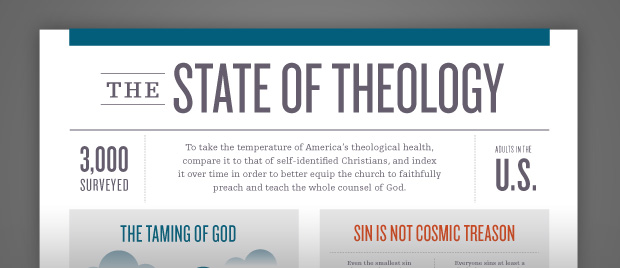The State of Theology: What’s Our Theological Temperature?
FROM Stephen Nichols
What is our theological temperature? To answer this question, we recently partnered with Lifeway Research to conduct a poll of 43 questions relating to the doctrines of God, Christ, the Holy Spirit, sin, salvation, the Bible, the church, and ethics. You can read all about the survey and see all the results atTheStateOfTheology.com. So, what’s our temperature?
Let me offer some broad stroke reporting of the findings. I’ll report. You decide.
The Survey Says
- The survey revealed significant confusion regarding the doctrine of God. In fact, the survey revealed significant numbers affirming such heresies as denying that the Holy Spirit is a person, and denying the deity of Christ.
- The survey revealed heretical views regarding human nature and sin.
- The survey revealed that less than half of Americans think the Bible is the Word of God and that it is true. These same numbers of the population reject what the Bible has to say on ethical issues, such as sex outside of marriage.
- The survey revealed that while 6 out of 10 believe in a literal heaven, less than half polled think you need to believe in Jesus to get there. And the survey revealed that while 6 out of 10 also believe in a literal hell, two-thirds think people are by nature good. In other words, we believe in hell, but there won’t be many people there.
- The survey also revealed that worshiping alone is just as valid as attending corporate worship in the church.
How Should We Then Respond?
So we have the answer to the question of our theological health. But this raises another question. How should we then respond?
It’s likely all to easy to be discouraged by the dismal results of this survey. This survey reveals theological confusion, as well as a blatant attitude of rejecting what God has revealed of Himself and His will. It also reveals a significant amount of theological ignorance. It might be legitimate to be disappointed, but we should steer clear of declaring that the sky is falling.
We see here what we have all suspected to be the case. Americans like God, and they like Jesus, too. Many even like the Bible. But they like all of this on their own terms. We prefer God our way, not His. But, let’s not be discouraged.
EPs
Perhaps one of the saddest aspects of this survey is how those in the pew stacked up against those in American culture in general. We surveyed 3,000 Americans. Most national polls we hear about tend to have a sampling pool around 1,000. We went over and above both to ensure accuracy and to give us data on specific groups.
We were keen to see how those in the pew stacked up against those in culture. We broke down churchgoers by affiliation, evangelicals. This is the category of Evangelical Protestants, the “EPs.” How did they do?
When asked if even the smallest sin deserves condemnation, only 51% of EPs could agree. Yes, that means 49% disagreed. 44% of EPs also agree that most people are by nature good.
But, let’s not be discouraged.
Marching Orders
In his short epistle Jude attests to his work of contending for “the faith that was once for all delivered to the saints.” We too need to contend for this once for all faith twenty centuries later. This survey reveals the necessity and the urgency for it.
While we don’t absolutely need the survey to remind us of our task, it does help to know exactly what we are up against—both in the culture and in the church. We aren’t governed by polls. We are governed by God’s Word. It helps to know our audience, and it helps to be reminded of the work we still need to do. We have our marching orders.
Since the release of this survey many have explored the reason or reasons behind the results, especially the reasons behind the poor health of those in the pews of our evangelical churches.
There is likely no single reason, but there are some significant reasons that we should consider. One is the American church’s fascination with programs, techniques, and methods. These should not consume us. Instead, we should be relying on the God-ordained ministry of the Word. God promises to bless His Word. We should believe Him.
One other reason might be the way we have relegated theology, and theological instruction, to the academy and to the experts.
C.S. Lewis once said, “If you do not listen to theology, that will not mean that you have no ideas about God. It will mean that you have a lot of wrong ones.” May we be encouraged. Encouraged to preach the word, to teach—and to listen to—sound theology, and may we join with Jude in contending for the faith that was once for all delivered to the saints.
Dr. Stephen J. Nichols is president of Reformation Bible College and chief academic officer for Ligonier Ministries.


